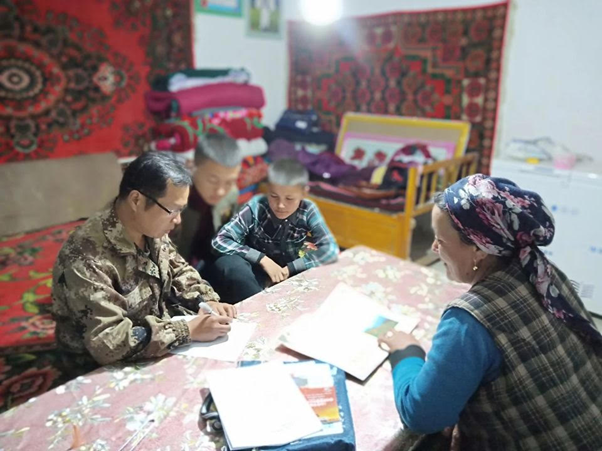The “Jieqin” Campaign: Ethnic Integration, Surveillance, and Grassroots Governance
Jieqin (结亲), also known as Minzu Tuanjie Yijiaqin (民族团结一家亲), refers to the idea that people from different ethnic groups should be united as a family, and was originally mentioned by President Xi Jinping on April 27th, 2014 when he was visiting a district in Kashgar, XUAR (Xinjiang Uyghur Autonomous Region) (Xinhua Net, 2014). Later, on October 17th, 2016, the current Party Secretary of Xinjiang, Chen Quanguo, launched the Jieqin campaign (Yao and Zhang, 2016). In the meeting, Chen emphasized that the campaign aimed to implement the “spirit” of Xi’s speeches. Following Chen’s directive, local governments at all levels soon organized “mobilization meetings” (动员大会) to implement the policies.
…
Under this program, in every work unit (including governmental and non-governmental organizations), Han Chinese civil servants are required to pair up with Uyghur or Kazakh families as ‘relatives’ (亲戚). Chen specifically emphasizes four prefectures (Kashgar, Khotan, Kizilsu, and Aksu) in southern XUAR (南疆四地州) that are mainly inhabited by Uyghurs and Kirgizs as the “key areas” (Yao and Zhang, 2016). Apart from “emphasized” prefectures, the program also prioritizes “nine populations” (九类人群): poor families, four retired people (retired cadres, retired communists, retired models, and veterans), religious people, people who need “thought work” (思想工作), ), family members of “focus” people (重点人员) who had been released from detainment camps, the floating population (流动人口), uncultured groups (文化程度不高人群), and special people (特殊群体) (Chang, 2020; Sheng & Yanitakqiao, 2017). Moreover, the program requires “three full coverages” (三个全覆盖), which means that government cadres, low income households, and the “focus” population must be all involved in Jieqin activities (Xu, 2018). The local governments also organize “pair-up ceremonies” (结亲仪式) in which cadres and civilians sign“heart-to-heart cards” (连心卡) and take “family photos” (全家福) to become ‘relatives’ (Chang, 2020). By the end of 2017, all cadres in XUAR (approximately one million cadres) had been paired up with 1.5 million families (Xu, 2018).
This program requires all governmental cadres to visit their paired-up families six times a year (every two months and five days per visit). During their visit, cadres must carry out si tong (四同), which includes “living together, eating together, learning together, and working together” (同吃、同住、同学习、同劳动). They have to pay 20-50 Chinese yuan per day to the ‘relatives’ for accommodations and meals (Chang, 2020). Besides visiting, cadres also have to contact their ‘relatives’ on a daily basis. The cadres need to communicate often with the ‘relatives’ via WeChat and their phones to monitor their thoughts, religious faith, and working/living conditions (Wang, 2019). Apart from si tong, the cadres also need to practice si song (四送), which includes “bringing law, bringing policy, bringing civilization, bringing warmth” (送法律、送政策、送文明、送温暖) (Also see the Four Togethers Three Gifts Handbook). Regarding the “bringing of law and policy”, the cadres are also required to achieve “eight clarifications” (八个讲清楚) (Chang, 2020):
Clarify that the Party’s Central Committee led by Xi Jinping shows loving care for the people of all ethnicities in the XUAR;
Clarify all Party’s policies that benefit the people;
Clarify ethnic and religious laws and policies enacted by the Party;
Clarify the “Xinjiang Aid” provinces’ generous aid to the XUAR people of all ethnicities;
Clarify the selfless contributions made by the XUAR army and armed police forces to the security and stability of the XUAR;
Clarify the harmful consequences of religious extremism and terrorism;
Clarify the important meanings of that all ethnicities in the XUAR are united and prospering together;
Clarify the positive change of the XUAR.
…
The Party in all units (各单位党组织) is required to organize diverse social activities (联谊) each month to substantiate ethnic integration and political propaganda (Cha, 2017; Chang, 2020). The activities include “collective learning” on the days of flag-raising ceremony (升旗日集体学习), lectures of “minzu knowledge” (民族知识讲座), topic forums (主题座谈会), watching feature films (观看专题片), and diverse forms of arts and physical activities (Chang, 2020; Wang, 2019). Through these activities, the Jieqin work propagates the spirit of the 19th National Congress (十九大精神), the minzu theories and religious policies of the Party, policies that benefit the people, the harm of “Three Forces,” and encouraging people to make a “Vow of Loyalty [to the party]” (发声亮剑), which requires participants to make an oath to support the Party and destroy the “three forces” and “two-faced people” (Chang, 2020). Other activities include talent shows, celebrating Chinese traditional festivals, enjoying each other’s foods, learning each other’s dances, and physical activities (Xu, 2018).



